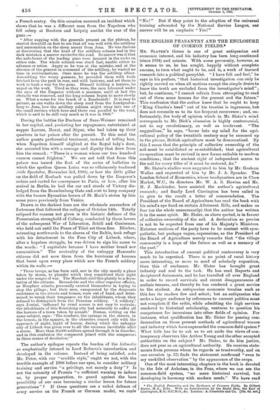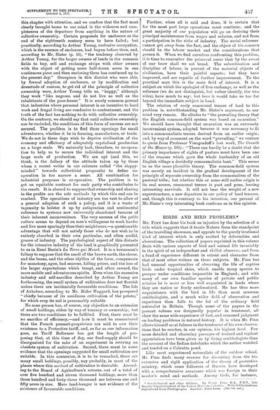THE ENGLISH PEASANTRY AND THE ENCLOSITRE OF COMMON FIELDS.*
MR. SLATER'S theme is one of great antiquarian and economic interest, and his industry has been long-continued (since 1894) and minute. With some perversity, however, as it seems to us, he has sought, happily without complete success, to turn what ought to be, and is, a work of learned research into a political pamphlet. " I have felt and feel," he says in his preface, "that historical investigation can only be rightly carried on when all motives except the simple desire to know the truth are excluded from the investigator's mind" ; but, he continues, " I cannot refrain from attempting to read out of them some lessons for the present and the future." This confession that the author knew that he ought to keep "King Charles's head" out of his treatise is ingenuous, but does not reconcile us to its too frequent recurrence ; and, un- fortunately, the body of opinion which in Mr. Slater's mind corresponds to Mr. Dick's obsession is highly controversial, not to say revolutionary, as well as irrelevant. " The suggestions," he says, "borne into my mind for the agri- cultural policy of the twentieth century may be summed up in the phrase, British agriculture must be democratised. By this I mean that the principle of collective ownership of the soil must be established or re-established; that agricultural co-operation must be revived in new forms suitable to modern conditions ; that the ancient right of independent access to the soil for every tiller of it must be restored, Sm."
Mr. Slater's studies were suggested to him by Mr. Graham Wallas and requested of him by Mr. J. A. Spender. The London School of Economics, whose headquarters are in Clare Market, W.C., its directors Mr. W. A. S. Hewins and Mr. H. J. Mackinder, have assisted the author's agricultural research ; and finally Lord Carrington has been called in to give to the result a letter of commendation. The President of the Board of Agriculture has read the book with his mind's eye fixed on certain Allotment Bills, and makes us fear (on the whole unnecessarily) that the author has written it in the same spirit. Mr. Slater, as above quoted, is in favour of collective ownership of the soil. A declaration so precise is not to be expected from one of his Majesty's Ministers. Extreme sections of the party have to be content with sym- pathetic, but perhaps vague, expressions, so the President of the Board of Agriculture merely remarks that "the village community is a hope of the future as well as a memory of the past."
This introduction of current political controversy is very much to be regretted. There is no point of rural history more interesting, or more in need of scholarly exposition, than this of enclosure. Mr. Slater has brought great industry and zeal to the task. He has read Reports and deciphered documents, and he has travelled all over England in order to record survivals and recent disappearances of archaic tenures, and thereby he has rendered a great service to the student. An antiquarian economic treatise such as this has its readers few and select; but an antiquarian who seeks a larger audience by references to current politics must not complain if the critic, while admitting the high services rendered to historical scholarship, ventures to question his competence for incursions into other fields of opinion. For instance, what qualification has Mr. Slater for passing con- demnation on those present methods of agiicultural tenure and industry which have superseded the common-field system ? What title has be to ask us to set aside the views of con- temporary observers like Arthur Young and the other accepted authorities on the subject ? Mr. Slater, to do him justice, does not pose as an agricultural authority. He receives state- ments from persons whom he regards as trustworthy, and on one occasion (p. 57) finds the statement confirmed " even to my unskilled observation" by the appearance of the crops.
One of the most interesting chapters in the book is devoted to the Isle of Axholme, in the Fens, where we can see the common-field system, "no mere historical survival, but developing in harmony with modern needs." We have read
The English Peasantry and the Enclosure of Common Fields. By Gilbert Slater, M.A., D.Sc. With an Introduction by the Right Hon. the Earl of Carrington, K.G., G.C.M.G., &c. London : A. Constable and Co. [los. 6d. net.]
this chapter with attention, and we confess that the fact most clearly brought home to our mind is the wideness and com- pleteness of the departure from anything in the nature of collective ownership. Certain proposals for enclosure at the end of the eighteenth century seem to have failed ; but practically, according to Arthur Young, exclusive occupation, which is the essence of enclosure, had begun before then, and, according to Mr. Slater (p. 56), " the tendency observed by Arthur Young, for the larger owners of lands in the common fields to buy, sell and exchange strips with other owners with the object of getting some half-dozen acres in one continuous piece and then enclosing them has continued up to the present day." Occupiers in this district who were able, by formal adoption of enclosure, or by modification and desuetude of custom, to get rid of the principle of collective ownership were, Arthur Young tells us, "happy," although they work " like negroes, and do not live so well as the inhabitants of the poor-house." It is surely common ground that industries where personal interest is an incentive to bard work and frugal living are conducive to contentment, and the truth of the fact has nothing to do with collective ownership. On the contrary, we should say that until collective ownership can be excluded, the conditions of this form of success are not secured.. The problem is to find these openings for small adventurers, whether it be in farming, manufacture, or trade. We do not in these days wish to deprive civilisation of the economy and efficiency of adequately capitalised production on a large scale. We naturally look, therefore, to co-opera- tion- to help us to secure the individual interest and the large scale of production. We are apt (and this, we think, is the fallacy of the attitude taken up by those whom a recent writer in our columns called " the sloppy- minded" towards collectivist proposals) to define co- operation in too narrow a sense. All combination for industrial purposes is co-operative. The problem is to get an equitable contract for each party who contributes to the result. It is absurd to suppose that ownership and sharing in the profits are the sole methods by which this end can be reached. The operations of industry are too vast to allow of a general adoption of such a policy, and it is a waste of ingenuity to bolster it up by antiquarian and sentimental reference to systems now universally abandoned because of their inherent inconvenience. The very success of the petite culture seems to depend on men's willingness to work harder and live more sparingly than their neighbours,--a questionable advantage that will not satisfy those who do not wish to be entirely absorbed in their own particular, and often sordid, groove of industry. The psychological aspect of this distaste for the intensive industry of the land is graphically presented to us in Rene Bazin's La Terre qui breurt. It is a townsman's fallacy to suppose that the smell of the brown earth, the clover, and the beans, and the other idyllics of the farm, compensate for. monotony, ague, bad seasons, falling prices, and the loss of the larger expectations which tempt, and often reward, the more mobile and adventurous spirits. Even when the excessive industry and self-sacrifice described by Arthur Young are forthcoming, the small system of cultivation does not flourish unless there are incidentally favourable conditions. The Isle of Axholme, according to Mr. Rider Haggard, has prospered " chiefly because of its assiduous cultivation of the potato," for which crop its soil is presumably suitable.
No sane person has, of course, any objection to an extension of small holdings, either by way of tenancy or ownership ; but there are two conditions to be fulfilled. First, there must be no sacrifice of efficiency,—and here it must be remembered that the French peasant-proprietors are said to owe their existence to a Protective tariff, and, as far as our information goes, no Tariff Reformer has got the length of pro- posing that, at this time of day, our food-supply should be disorganised for the sake of an experiment in reviving an obsolete system of cultivation. Second, there must be some evidence that the openings suggested for small cultivation are suitable. In this connexion, it is to be remarked, there are many small holdings, possibly, nay probably, in most of the places where this method of cultivation is desirable. Accord- ing to the Board of Agriculture's returns, out of a total of over five hundred and eleven thousand holdings, more than three hundred and forty-three thousand are between one and fifty acres in size. Mere land-hunger is not evidence of the existence of favourable conditions.
Further, when all is said and done, it is certain that for the most part large operations must continue; and the great majority of our population will go on deriving their principal maintenance from wages and salaries, and not from a participation in the risks of industry. The social reformer cannot get away from the fact, and the object of his concern should be the labour market and the considerations that govern it. When we find ourselves confronting this problem, it is time to remember the primeval curse that by the sweat of our brow shall we eat bread. The subordination and discipline of labour, in pursuit of the material objects of civilisation, have their painful aspects ; but they have improved, and are capable of further improvement. To the practical man this is the main field of interest. It is a subject on which the apologist of free exchange, as well as the reformer (we do not distinguish, but rather identify, the two roles), have much to say ; but here it would take us too far beyond the immediate subject in hand.
The relation of early communal tenure of land to this problem is, notwithstanding Mr. Slater's argument, to our mind very remote. He alludes to " the prevailing theory that the English common-field system was based on co-aration." We should have thought that co-oration was an extremely inconvenient system, adopted because it was necessary to fit into a communalistic tenure derived from an earlier origin; and, by way of comment on the word "prevailing," we venture to quote from Professor Vinogradoff's last work, The Growth of the Manor (p. 181) : " There can hardly be a doubt that the primary importance of rights of pasture must have been one of the reasons which gave the whole husbandry of an old English village a decidedly communalistic bent." This seems to us the more plausible theory. The common-field system was merely an incident in the gradual development of the principle of separate ownership from the communalism of the pastoral tribe; but whether this or some still earlier origin is its real source, communal tenure is past and gone, leaving interesting survivals. It will not bear the weight of a new superstructure, a new departure in our policy of land tenures, and, though this is contrary to his intention, our perusal of Mr. Slater's very interesting book confirms us in this opinion.































































 Previous page
Previous page